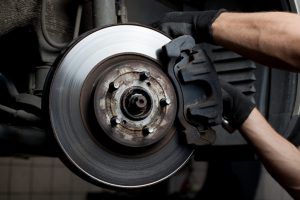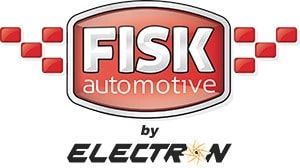When Is It Time for New Brake Pads?

Brake pads and shoes are known as “friction material” because they are what provide the necessary friction to stop a vehicle. They’re often the main focus when it comes to brake maintenance, but if the brake pads have around 2-3mm left in remaining friction, it’s time to be pro-active and have them replaced to optimize performance and prevent damage to other components. Brake shoes if equipped on your model are suggested at 2mm or less remaining friction.
Brake shoes are generally part of the rear brakes unless it’s a very old car where they were used all around until disc brakes were introduced. The brake shoes sit inside the brake drums. When you press on your brake pedal, this pushes fluid to the wheel cylinder. This expands the brake shoes to contact the brake drum. The friction between the brake shoe and the brake drum is what slows your vehicle down. But the brakes shoes also help to hold the car in place especially on a grade. When you pull, or push on your emergency brake, they expand out and contact the drum to lock the car in place.
Brake pads and brake shoes have a steel backing and have a specialized friction material riveted or bonded to the metal part of the pad or shoe. Brake pads and shoes work together to help stop your vehicle.
Why should I be pro-active and have my brake pads replaced?
Worn brake pads can lead to more costly repairs, such as damaged rotors or calipers. Brake pads are what give your vehicle the ability to make immediate stops, and avoid collision. This means that worn brake pads can increase your chance of an incident, since your vehicle may no longer have the ability to make confident or abrupt stop. Brakes are one of the most important safety mechanisms on your vehicle.
What are the warning signs that it is time for new brake pads?
To help avoid the dangers of a brake system failure, here are some warning signs that it is time for new brake pads:
- You hear screeching, grinding, squealing, rubbing, or other abnormal noises.
- You feel vibration and pulsation in your steering wheel or in the pedal itself.
- Brake pads appear thin, or less than 2 mm thick.
- You find yourself pressing the pedal down farther to brake.
- Your brake warning light comes on.
- The ABS may be on.
If you notice any of these signals occur in your vehicle, it’s time to give your friends at Fisk Automotive a call.
Did you know that brake fluid is a service item?
Brake fluid is often neglected when vehicles are serviced. Brake fluid can be and should be tested to make sure it is not damaging or contaminating the other parts of the hydraulic brake system. Brake fluid over time becomes contaminated with moisture and that is the worst thing for any component coming into contact with the brake fluid. Get your brake fluid tested today at Fisk Auto to make sure your brake system is protected.
It’s important to remember that simply replacing your brake pads every once in a while isn’t enough to maintain your vehicle’s safety and stopping performance. Always have the entire braking system checked, cleaned or serviced regularly. We are more than happy to help you with your brake repair, or brake maintenance needs.

Fullerton's Finest Auto Care Since 1973
Our commitment to customer satisfaction drives everything we do, and we strive to provide a seamless and hassle-free experience for every customer who walks through our doors. Experience the difference with Fisk Automotive, where your vehicle is in good hands.
Contact Us
M-F 8am-5pm
M-F 8am-5pm
All Rights Reserved | Fisk Automotive
